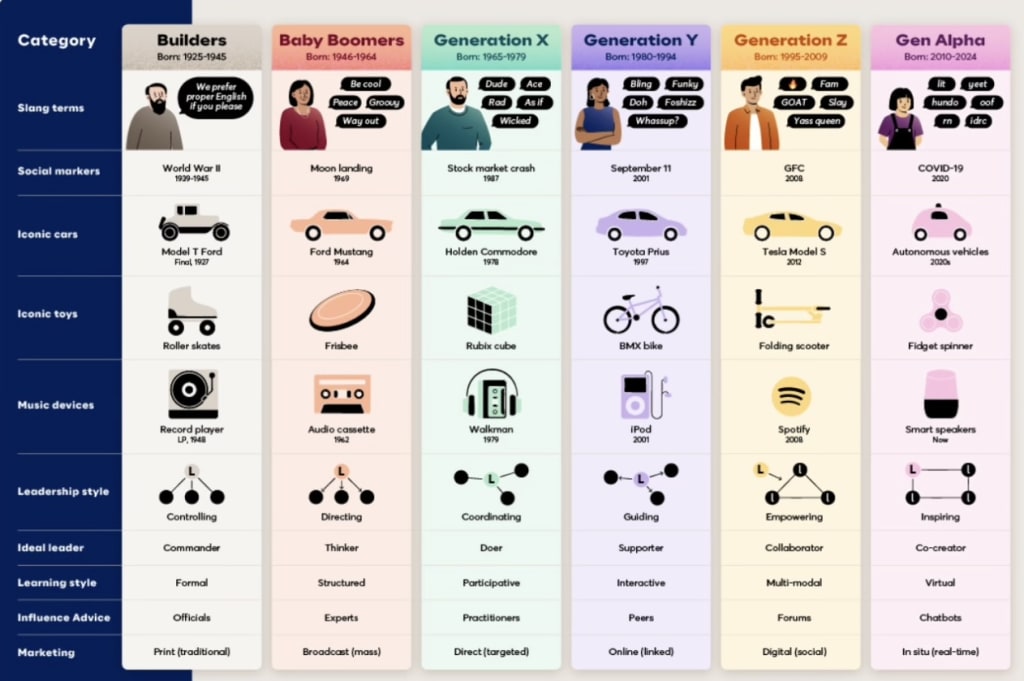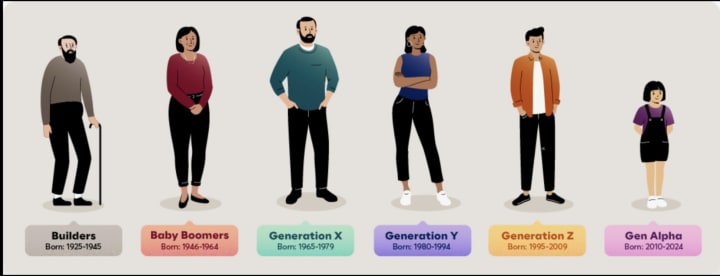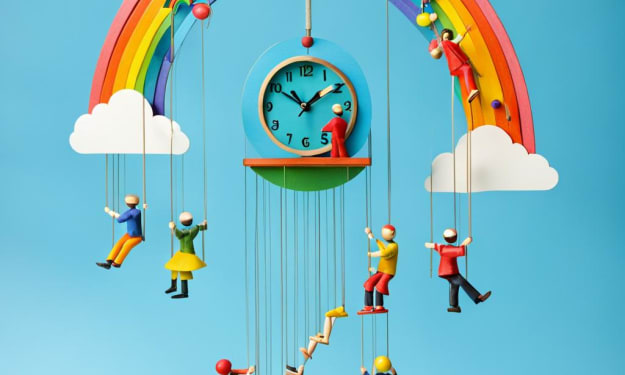From Gen Builders to Gen Alpha. Is Gen Z the loneliest Generation?
The Generations of evolution

Do you joke about the Tiger Mothers at the school gate, rushing their kids to violin classes and extra Maths, determined to win a race we didn’t even know we were in. There were children who had never been on a bus, knowing only the car, and who were nervous at the old-fashioned birthday parties in the garden, being used to orchestrate an educational entertainer.
Parents, are you tracking your adult children on their phones?
Intensive parenting has created adults who are either deeply anxious, or who would opt to leave home as fast as they could. America’s Pew Research Center finds that only 9 per cent of 18 to 34-years-old say their parents are too involved in their lives, despite a large majority of parents admitting to texting or phoning their offspring several times a week, and giving advice on jobs, finances and health.
Gen Z seem pretty Zen with parents who can’t let go. Far from being fed up with all the intrusion, the majority say they rely on their parents for emotional and financial support. Is this reassuring or troubling. Should we cherish every day that our children remain willing to put up with us.
It does, though, raise an entirely different question. In focusing on the strain that helicopter parents may place on kids, we have ignored the increasing emotional and financial burden being shouldered by modern parents. The cost of raising children is rising all over the developed world, parents are shelling out for childcare, clubs and activities to boost academic success. Working mothers spend as much time with children as stay-at-home mothers did in the 1970s: in the UK, nearly half of working-age women do up to 45 hours a week of childcare: more than the average working week. Some are also looking after elderly parents.
In the Pew survey 71 per cent of parents say their children's successes and failures reflect on the job they’ve done as parents. This feels like a big shift from earlier generations who felt pride if their children did well, but didn’t take credit for their achievements.
Perhaps the modern parent, screaming at their child on the touchline or doing their homework for them, is expecting a more sharply delineated return on investment. Heartbreakingly, a quarter say they have felt “disappointed” in their child: a word which feels more apt for someone who joins a gang than someone who (I imagine) has failed to land an internship.
Relentless parenting to turn children into status symbols, fulfilling a particular definition of success, used to be chiefly an upper-class phenomenon. But now it is sweeping society. In the US, parents of all classes support intensive parenting and extracurricular activities. In the UK, some lower-income parents report being acutely aware of the effect they can have on a child’s development, and over 70 per cent of parents of young children report feeling judged by others.
It’s rational to want to boost your child’s chances in a world where academic success is increasingly correlated with higher wages, and where Gen Z are the first generation likely to be worse off than their parents. Countries with the most intensive parenting are often those with the most economic anxiety. Families are more relaxed in socially mobile environments.
It can’t be healthy that some of the parents who started out playing Bach to babies in utero have now graduated to making their 20-somethings’ hairdressing appointments, phoning their employers about issues at work, and even arriving on university campuses to wake them up and make them breakfast. But it reflects a wider trend: as we live longer, adolescence seems to be extending, and people are settling down later. Young people are opting out of being parents.
This raises questions about how we, as a society, navigate these changes. What should adult children expect of their parents, and what should parents expect of themselves? When do modern children actually become “grown-up”? And how much should we know about their lives?
There are certain things we shouldn’t know about our kids, and shouldn’t want to. Yet when asked, some students react differently to the advent of GPS Big Brother, one said it makes her feel safer and another said he uses it to keep an eye on his parents, who don’t even know how to track him. These responses feel rather grown-up.
In placing overwhelming expectations on themselves, today’s parents will be a hard act to follow. The paradox is that in going the extra mile to support them, parents may be reducing their chances of ever getting a grandchild.

Young people are struggling to balance real and digital relations.
Should more be done to address the impact the pandemic and cost of living crisis has had on young people. New data has shown that three times as many 16-24 years old – 19% – often or always feel lonely compared to 65-74 years old – at 6%.
Research released by Eden Project Communities, revealed that young people and those living in cities are hit hardest by isolation, contrary to stereotypes that older people suffer the most.
There is definitely an increase in anxieties in the younger generation, with a lack of confidence and self-esteem, amidst issues with motivation too, especially for those that were doing exams during Covid. They think things like “what’s the point of going to school and doing exams for so many years.”
The pandemic was a real knock for a lot of young people. An ever-changing digital era has seen them rely on digital connections instead of in-person experiences.
In the UK, programs like Project Zero hosts a community hub with a cafe, radio station and event hall – to let young people enjoy real life activities rather than stay home. The community-based project delivers youth engagement projects to promote social inclusion and reduce offending and anti-social behavior.
Steve Barnabis of Project Zero says:
"There are phones and technology these kids have to keep in touch with each other, but in a way, it’s harder for young people to connect with each other. After Covid, many are struggling to get out and socialize again. There was a period of time when kids were more reliant on phones and urged to rely on technology – so moving away from that mindset will be hard".
Feeling as part of a community can help, so that’s brilliant motivation for everyone to reach out and start connecting.
Tracy Robbins and the Eden Project Communities have urged communities to work together to reduce isolation.
You could host a #BigLunch or visit the organization’s website for tips on how you can make a difference to the loneliness epidemic.
Get in touch with their news team by emailing them at [email protected].
....................................................................................................
Excerpts from:
The Financial Times
'Generation Z are now 'the loneliest generation' . Story by Kirsten Robertson
Metro
Tracy Robbins and Eden Project Communities
About the Creator
Novel Allen
Clouds come floating into my life, no longer to carry rain or usher storm, but to add color to my sunset sky. ~~ Rabindranath Tagore~~
Reader insights
Outstanding
Excellent work. Looking forward to reading more!
Top insights
Compelling and original writing
Creative use of language & vocab
Easy to read and follow
Well-structured & engaging content
Expert insights and opinions
Arguments were carefully researched and presented
Eye opening
Niche topic & fresh perspectives
Heartfelt and relatable
The story invoked strong personal emotions
Masterful proofreading
Zero grammar & spelling mistakes
On-point and relevant
Writing reflected the title & theme







Comments (15)
Congratulations for top story "Wow, your creativity shines like a beacon in the night! Your work is truly captivating and always leaves me in awe. Keep dazzling us with your talent!"
Baby Boomer with the best iconic car in the table (for sure!) I try to group chat with all my Gen Z grandkids. We all love it...they secretly, and sometimes blatantly make fun of old Boomer and I have to look up all the new "shorthand" lingo in their language.
Congrats on Top Story!🥳🥳🥳
Fascinating, concerning & reassuring all at the same time.
As a GenXer, I feel no envy for these kids. And I see these issues all the time at the college I work at. It is so bad in some cases that parents are now accompanying their kids to...job interviews! Please let them live a real life. You can't walk without falling a few times...
I feels very good.
I think about the parents that pay people to take the college entrance exams for their children. How does that help, in the long run? What does that really mean:”I don’t think you can do it on your own!”?
Back to say congratulations on your Top Story! 🎉💖🎊🎉💖🎊
This is heartbreaking but really interesting. Congrats on Top Story!
Fascinating, I love generationology.
Great article. I guess it's hard for some to communicate, other than digitally. Congrats on the TS.
I'm a Millenial who's an introvert with social anxiety. I somehow fall somewhere on this spectrum but I don't feel lonely at all. I also have agoraphobia and I despise human interaction. I don't know, I'm just probably weird 😅
OMG Allen! I absolutely agree with you. This Gen Z is an lonely generation. Whether this is your research, observation or experience with the generation, you surely did a good job here. This is wonderful. And my question is, can the generation be saved?
I found this to be a well-thought-out overview of modern society. I'm a Boomer and work with some Gen Z. They have lost the art of communication and self-reliance. Sometimes change is not always for the best.
This is depressing and surprising in equal measure! I'm shocked to learn that Generation Z feel more lonely than elderly people, but it rings true in my local community. I often see retirees out chatting in their gardens; they all know each other on the bus and attend community lunches and things, but there are really limited social opportunities, other than sport, for young people. Good luck to Project Zero!